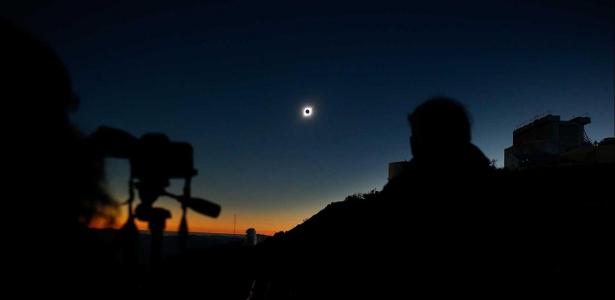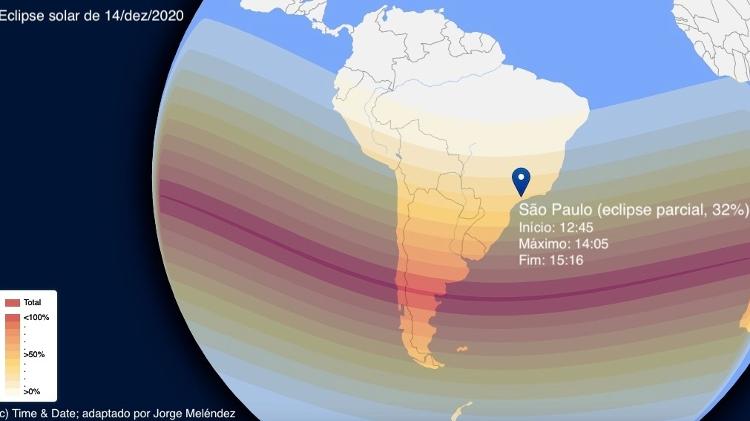
[ad_1]
In times of confinement, a spectacle of nature helps to remove a bit of monotony, right? Then you can celebrate. This Monday (14) there will be a solar eclipse, one of the most anticipated phenomena by lovers of astronomy.
The solar eclipse occurs when the Moon intervenes between the Earth and the Sun, hiding, totally or partially, its light. But don’t be so excited. Only in some regions of Chile and Argentina will it be possible to observe the eclipse in its entirety, when the apparent diameter of the Moon is greater than that of the Sun, blocking all direct sunlight. Here in Brazil, it will only be partially seen in some cities from morning to afternoon.
“An eclipse of the Sun is always seen as total in just a narrow strip on the surface of the Earth. This time, it will only be in the south of the Pacific Ocean, south of the Atlantic Ocean and in a small region of Chile and Argentina ”, he explains. the researcher of the National Observatory Josina Oliveira.
The eclipse will be seen as partial in the Pacific Ocean, central and southern South America, the extreme southwestern region of Africa, and Antarctica. In Brazil specifically, it will be partially seen in the South, Southeast, and parts of the Midwest, Northeast, and North regions. The further south, the greater the portion of the solar disk that will darken..
The Time and Date website informs you if it will be possible to observe the phenomenon in your city. In the city of São Paulo, for example, the partial eclipse will begin at 12:45 pm, will reach its peak (32% occultation of the solar disk) at 2:05 pm and will end at 3:16 pm
To ensure good visibility of the eclipse, it is still necessary to wait for a little help from the sky so that the clouds do not obscure the show. See what the weather forecast will be like in some capitals where the phenomenon can be observed, at rush hour:
- Porto Alegre: Peak at 13:51 (54%): 27 ° C, partly cloudy
- Florianópolis: peak at 1:58 p.m. (45%): 25 ° C, cloudy
- Curitiba: peak at 1:57 pm (37%): 26 ° C, with a chance of rain
- São Paulo: Peak at 2:05 pm (32%): 29 ° C, with a chance of rain
- Rio de Janeiro: peak at 2:14 pm (31%): 31 ° C, with a chance of rain
- Belo Horizonte: apex at 2:13 pm (21%): 28 ° C, partly cloudy
- Brasilia: Apex at 2:03 pm (8.5%): 29 ° C, partly cloudy
- Salvador: Summit at 2:30 pm (6%): 28 ° C, sunny
How to observe
Witnessing a solar eclipse requires some care so as not to damage your vision. The first is that you cannot see the event directly. Among the instruments used to observe the phenomenon are special goggles or a welding mask.
Telescopes, binoculars and cameras can also be used, but only if they have adequate filters on the lens or aperture, which allow them to be directed towards the sun. You cannot use conventional sunglasses, X-ray sheets or film negatives; All of these methods can cause permanent damage to your vision.
An advice given by Josina Oliveira, from the National Observatory, will use a filter Glass soldering iron number 14 or higher, found in hardware stores. Even with this glass it is only possible to search for about 30 seconds, having to pause for a while ”, he teaches.
For those who will not be able to witness the eclipse or who want to see it from different angles, there will be live broadcasts from different sources, including NASA itself and the Exploration website, with images from Chile.
